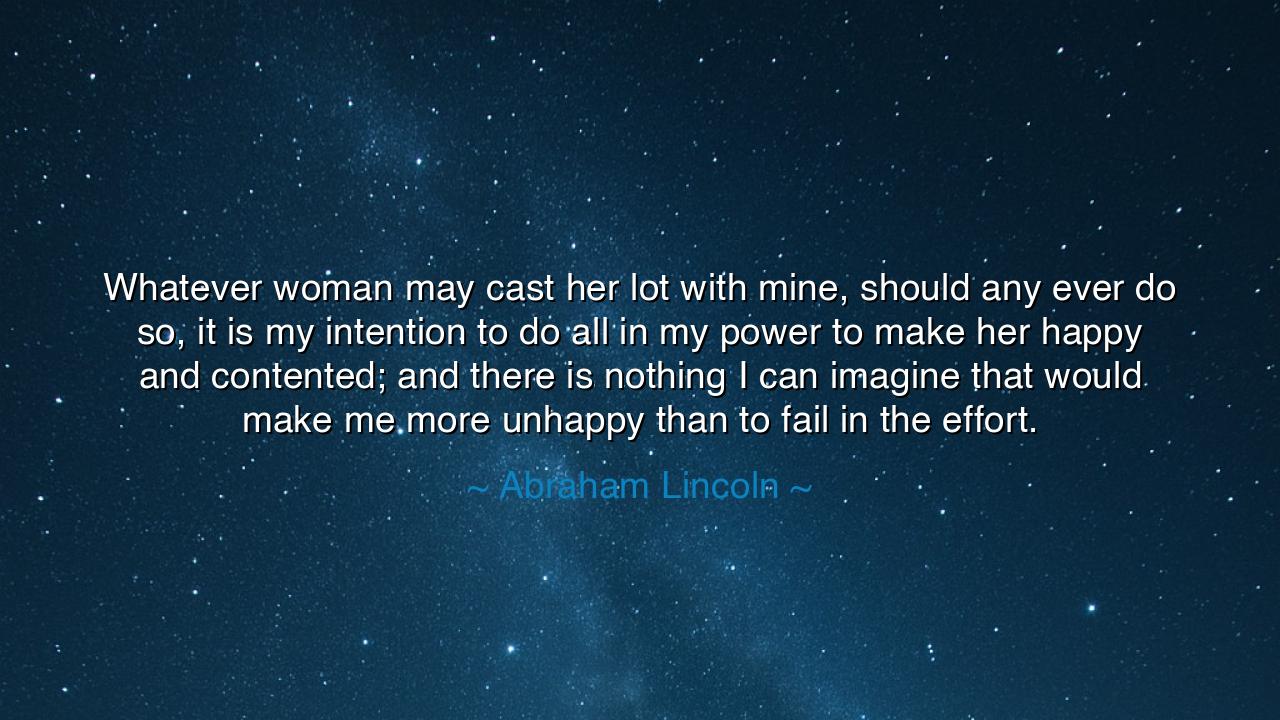
Whatever woman may cast her lot with mine, should any ever do
Whatever woman may cast her lot with mine, should any ever do so, it is my intention to do all in my power to make her happy and contented; and there is nothing I can imagine that would make me more unhappy than to fail in the effort.






The words of Abraham Lincoln—“Whatever woman may cast her lot with mine, should any ever do so, it is my intention to do all in my power to make her happy and contented; and there is nothing I can imagine that would make me more unhappy than to fail in the effort.”—are the utterance of a heart both humble and noble. They reveal the spirit of a man who, though destined for greatness, saw his truest strength not in conquest or power, but in devotion. For Lincoln understood that love is not possession, but stewardship; not a crown to be worn, but a duty to be fulfilled with tenderness and constancy.
This saying is a testament to the sacred responsibility of union. To bind one’s life to another is no light vow, but the acceptance of a solemn charge: to nurture, to protect, to uplift. Lincoln’s words show not the pride of one who expects loyalty, but the humility of one who fears failing in love’s greatest duty. His voice trembles with the knowledge that true honor lies not in triumph over enemies, but in faithfulness to one’s beloved.
History itself bears witness. When Marcus Aurelius, emperor and philosopher, spoke of his gratitude for his wife Faustina, he praised her not for what she gave to him, but for the partnership they shared in both joy and trial. Like Lincoln, Marcus knew that even the ruler of nations is judged not only by laws and victories, but by how he cherishes those bound to him in intimacy. For in the private covenant of marriage lies the measure of a man’s soul.
The quote also reveals Lincoln’s vulnerability and humanity. Before he was the Great Emancipator, before the weight of the Union rested upon his shoulders, he was a man who longed simply to love well and to avoid causing pain. It is this humility—this fear of failing in tenderness—that made his strength in public life so enduring. For one who trembles to fail in love will also tremble to fail in justice, in mercy, in truth.
Let this wisdom endure: that love is not a prize but a calling. Whoever binds their fate with yours entrusts you with their happiness, and to guard that trust is the highest labor of the heart. As Lincoln teaches, the gravest sorrow is not to be defeated by the world, but to fail in the effort to make those we love happy and contented. To live with such devotion is to walk the path of greatness, not only in history’s eyes, but in eternity’s.






NPNgan Pham
There’s something profoundly sincere about this declaration. It captures a kind of love rooted in service, empathy, and moral strength rather than possession or desire. It makes me think about how rare it is to hear someone speak about relationships in such ethical terms today. Could this reflect an era when love was seen less as self-fulfillment and more as a moral promise?
Nnhu
This feels like a window into Lincoln’s emotional depth. His tone suggests not passion in a fleeting sense, but a lifelong commitment to care. I admire how he frames love as both privilege and responsibility. Yet, I can’t help but wonder if such high expectations of oneself might lead to constant worry—what happens when love meets the imperfections of real life?
GTNguyen Ly Gia Thien
I find this statement both touching and melancholic. There’s such humility in acknowledging that one’s greatest fear in love is failing to bring joy to a partner. It reflects Lincoln’s integrity and empathy, even in his private life. But it also raises a question—should happiness in a relationship depend so much on one person’s effort, or should it be a shared, mutual pursuit?
LTle thuy
This quote reveals such a tender and selfless view of love. Lincoln’s words show not just romantic idealism but a deep sense of duty and emotional responsibility. It makes me wonder how many people today approach relationships with this same mindset—to prioritize another’s happiness over their own ego. Is this kind of devotion still common, or has modern love become more self-centered?